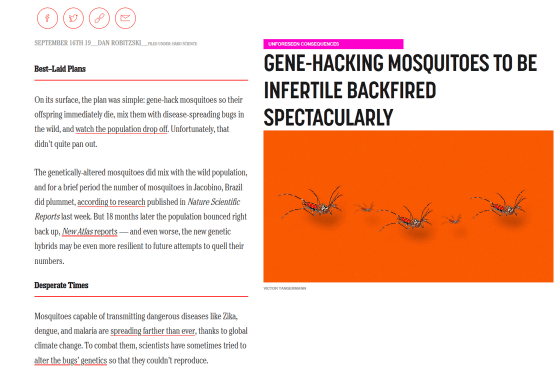An experiment to eradicate genetically modified mosquitoes in the wild has failed, with unexpected results

by
Mosquitoes are not only annoying when they are stabbed, but they also annoy people by mediating infectious diseases such as dengue , zika and malaria . In order to eradicate mosquitoes that transmit such infectious diseases, experiments were conducted in Brazil to release mosquitoes that had been killed by the offspring born by manipulating genes in the wild, reducing the number of mosquitoes, However, the experiment was reported to have failed.
Transgenic Aedes aegypti Mosquitoes Transfer Genes into a Natural Population | Scientific Reports
https://www.nature.com/articles/s41598-019-49660-6
GM experiment may have strengthened wild mosquitoes
https://newatlas.com/science/genetic-engineering-mosquito-experiment-goes-wrong/
Gene-Hacking Mosquitoes to Be Infertile Backfired Spectacularly
https://futurism.com/the-byte/gene-hack-mosquitoes-backfiring

With global warming, the range of dangerous mosquitoes such as
One solution to reduce the number of mosquitoes is to “release mosquitoes that incorporate a gene that kills offspring into the wild”. When a genetically modified male mosquito developed by Oxitec in the UK mates with a female, the offspring cannot grow due to the action of certain enzymes accumulated in the body and are given the property that they die before breeding The By releasing this genetically modified mosquito into the wild, the number of individuals can be reduced.
As for the method of releasing genetically modified mosquitoes into the wild, there is a lot of debate about safety, and there is also a warning for eradicating certain organisms with human hands. However, experiments to release already genetically modified mosquitoes into the wild have begun in several regions.
Possibility of a release experiment eradicating Aedes aegypti that mediates malaria, dengue, and zika with genetically engineered mosquitoes-gigazine

In Jacovina , Brazil, where large-scale experiments are being conducted to release genetically modified mosquitoes, researchers at Yale University conduct ongoing research on mosquito populations. In the experiment, 450,000 genetically modified mosquitoes were released every week, and mosquitoes were released for 27 months. In total, tens of millions of genetically modified mosquitoes have been released into the wild.
As a result of the research team investigating the number of mosquitoes, it seems that initially a decrease in the number of mosquitoes was confirmed, but the population began to recover after about 18 months. The team pointed out that the results may have led wild females to avoid mating with genetically modified males. However, at the end of the test, wild mosquitoes were captured and analyzed for genes, and individuals who inherited the genetically modified mosquito genes were confirmed.
Prof. Jeffrey Powell , the lead author of the paper, said, “The original claim was that the offspring of genetically modified mosquitoes would die, so the gene was not mixed with wild mosquitoes.” “But actually What happened was different. ” The probability that a genetically modified mosquito offspring will be born is about 3-4%, and the born offspring were expected to die before growing and breeding, but in reality a certain number of offspring were born Pattern.
Furthermore, the genetically modified mosquitoes were not the Brazilian strains that were tested, but the Aedes aegypti with Cuban and Mexican strains. New mosquito groups that have inherited multiple strains and artificial genetic modification may be more resistant than traditional mosquitoes in the worst case. The research team believes that the new subspecies is less dangerous than the traditional mosquito, but Powell said 'I'm concerned about unexpected results.'

by FotoshopTofs
Related Posts:







